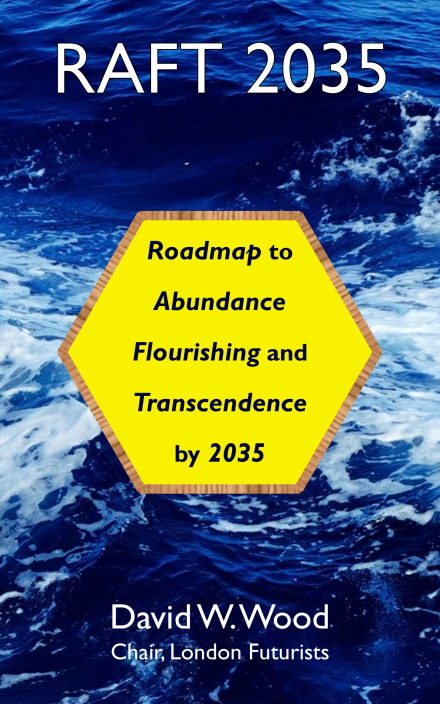This page contains the opening portion of Chapter 4 of RAFT 2035.
Copyright © 2020 David W. Wood. All rights reserved.
4. Homelessness and hunger
Goal 4 of RAFT 2035 is that there will be no homelessness and no involuntary hunger.

Goal 4 can be seen as a special case of Goal 3. No one will need to obtain paid work in order to enjoy a life of abundant flourishing. Therefore, present-day problems such as homelessness and involuntary hunger must become things of the past.
After all, secure shelter and reliable access to nutritious sustenance form the basis for many other positive experiences in life.
A stark assessment
The situation in the United Kingdom is described in a November 2018 report by Professor Philip Alston, United Nations Special Rapporteur on extreme poverty and human rights. Here’s how the report starts:
The UK is the world’s fifth largest economy, it contains many areas of immense wealth, its capital is a leading centre of global finance, its entrepreneurs are innovative and agile, and despite the current political turmoil, it has a system of government that rightly remains the envy of much of the world. It thus seems patently unjust and contrary to British values that so many people are living in poverty. This is obvious to anyone who opens their eyes to see the immense growth in foodbanks and the queues waiting outside them, the people sleeping rough in the streets, the growth of homelessness, the sense of deep despair that leads even the Government to appoint a Minister for suicide prevention and civil society to report in depth on unheard of levels of loneliness and isolation. And local authorities, especially in England, which perform vital roles in providing a real social safety net have been gutted by a series of government policies. Libraries have closed in record numbers, community and youth centres have been shrunk and underfunded, public spaces and buildings including parks and recreation centres have been sold off. While the labour and housing markets provide the crucial backdrop, the focus of this report is on the contribution made by social security and related policies.
The results? 14 million people, a fifth of the population, live in poverty. Four million of these are more than 50% below the poverty line, and 1.5 million are destitute, unable to afford basic essentials. The widely respected Institute for Fiscal Studies predicts a 7% rise in child poverty between 2015 and 2022, and various sources predict child poverty rates of as high as 40%. For almost one in every two children to be poor in twenty-first century Britain is not just a disgrace, but a social calamity and an economic disaster, all rolled into one.
But the full picture of low-income well-being in the UK cannot be captured by statistics alone. Its manifestations are clear for all to see. The country’s most respected charitable groups, its leading think tanks, its parliamentary committees, independent authorities like the National Audit Office, and many others, have all drawn attention to the dramatic decline in the fortunes of the least well off in this country. But through it all, one actor has stubbornly resisted seeing the situation for what it is. The Government has remained determinedly in a state of denial. Even while devolved authorities in Scotland and Northern Ireland are frantically trying to devise ways to ‘mitigate’, or in other words counteract, at least the worst features of the Government’s benefits policy, Ministers insisted to me that all is well and running according to plan. Some tweaks to basic policy have reluctantly been made, but there has been a determined resistance to change in response to the many problems which so many people at all levels have brought to my attention.
Also in November 2018, homelessness in the UK was reported as reaching a record high, with 170,000 families and individuals experiencing destitution. This includes 38,000 under-25s and 4,200 over-65s. What’s worse, homelessness has increased every year since 2012.
The UK’s homeless rate of around 0.46% of the population compares poorly with that of many other countries, including Germany (0.37%), France (0.21%), Finland (0.13%), Spain (0.09%), Italy (0.08%), Norway (0.07%), Portugal (0.03%), South Korea (0.022%), and Japan (0.0039%). This gives confidence to the view that homelessness in the UK can be significantly reduced.
Addressing causes of homelessness
Many cases of homelessness arise, not from a shortage of available accommodation, but from individuals suffering psychological issues. This element of homelessness will be addressed by the measures in Goal 2 to significantly reduce mental health problems.
But a number of additional solutions are available to help abolish homelessness. First and foremost, the construction industry should be assessed, not just on its profits, but on its provision of affordable good quality homes – as part of the emerging tech-enabled abundance for all.
Consider the techniques used by the company Broad Sustainable Building, when it erected a 57-storey building in Changsha, capital city of Hunan province in China, in just 19 working days. That’s a rate of three storeys per day. Key to that speed was the use of prefabricated units.
Other important innovations in construction techniques that should be supported and accelerated include 3D printing, robotic construction, inspection by aerial drones, and new materials with unprecedented strength and resilience.
<snip>

